April Showers: Blue Jasmine
 Monday, April 30, 2018 at 8:15PM
Monday, April 30, 2018 at 8:15PM 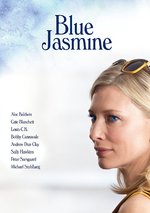 A final April Showers for the month. Here's Ilich on Blue Jasmine (2013).
A final April Showers for the month. Here's Ilich on Blue Jasmine (2013).
Blue Jasmine takes on the narrative of Tennessee William's A Streetcar Named Desire and removes it from its intended New Orleans setting to soak it in the San Francisco coastline. It's there that Jasmine (formerly Jeanette, always Cate Blanchett) reluctantly calls her sister's place home after her socialite life in New York City less than gently escorts her out. Water and cleansing are only a couple of the elements used to contrast her former, generously sponsored life in the city—shown in abrupt flashbacks throughout—against her less sophisticated past and current unraveling.
It's a paralyzing shower that sets Blanchett's Jasmine up for her last scene, but both mean little without the context provided before that give us an insight into Jasmine's aspirations and self-destructive habits. The film is as fascinated with its lead's denial as we are with Blanchett's performance...
The actress, so used to adorning her performance with tics and affection is perfectly cast here as a woman performing to convince others of many things she isn't in both the best and worst stages of her life. And in case Blanchett's eyes in the poster or the film's soundtrack didn't scream it loud enough, she's blue, dammit!
Helping set up blow of the film's closing scene, costume designer Suzy Benzinger shows Jasmine's Chanel blazer during better times (for both it and Jasmine) during a flashback where she casually discusses her attendance to the Met Gala with a then-equally well-off friend. At this point, we've already seen the blazer look less exquisite in the film's opening scene up in the air. But here, on top of being accessorized by Chanel pearls and blowout, it's lit to look cleaner and more expensive than when Jasmine wears subsequently it in San Francisco. It's about to go through some life and it won't come out of it as pretty.
The first time we see Jasmine getting clean is in a flashback where she's getting bubbles all over her new diamonds. Notably, she's taking a bath because, you know, rich people have time for that kind of thing and also this is a prestige drama with a female lead so this tableau is requisite. At this point in her life, taking a bath isn't a luxury for her. She can take the hour to soak in her privilege and ignore the havoc she vaguely knows her husband is wreaking. Their wealth is noisy enough to suffocate whatever amount of their conscience directs them to the right thing.
Her next cleansing has less gold accents. Crammed into the unflattering shower at her sister's house, there's very little room for Jasmine to move. Her husband has gone to jail and killed himself after leaving her with close to nothing. The few connections that remained after that—her sister, her stepson, her short-lived engagement—were all sabotaged by the lies that so easily rolled out of her and the aspirations that she wasn't designed to reach on her own. Now, the noise of the shower isn't close to enough to drown out the voices in her head that she's been left alone with.
Crushed by her own tragedy, Jasmine goes out into the world with nothing left to lose yet without the ability to build much more. Her reality escapes her and can't yet tether her to a happy ending.
I used to know the words. I knew the words. Now they're all a jumble.



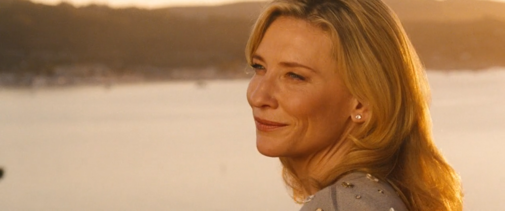
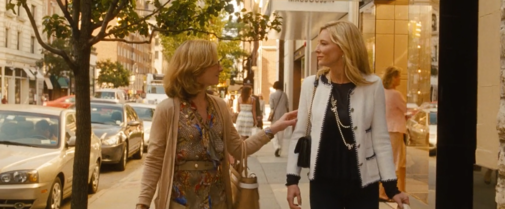
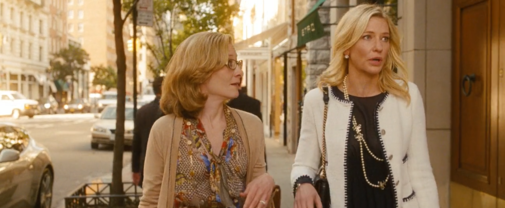
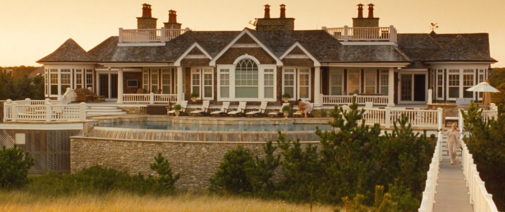
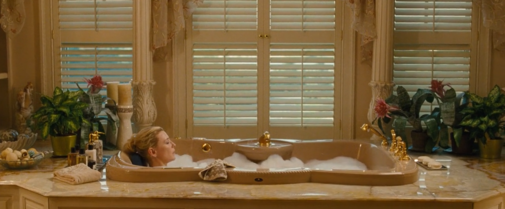
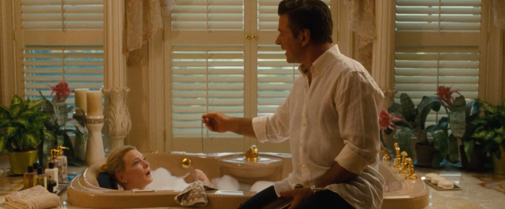
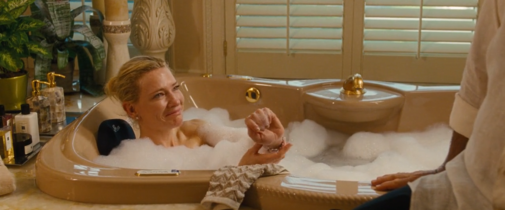
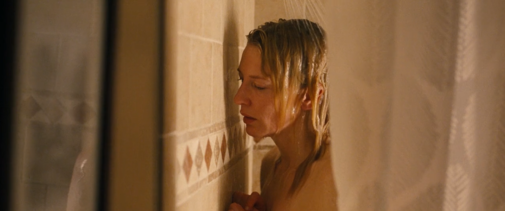
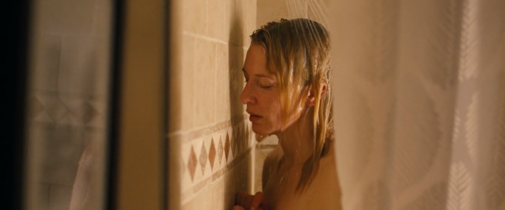
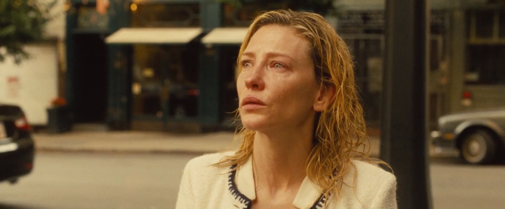
Reader Comments (14)
The best performance of the decade.
Woody Allen's best film of the decade. Hell, one of the best of his career. It's merciless but actually less misogynistic than a lot of his work.
Everyone remembers Cate, and no wonder, but Sally Hawkins was also soo good in this.
Lylee : agreed. In hindsight, Hawkins should have won Supporting Actress.
Her best performance! She is extraordinary in this. I felt like I was watching a documentary about the downfall of Jasmine French
She was sublime here and in CAROL.
I just can't fathom how during this current period of her career we really had great highs and the lowest of lows (Ragnarok, Cinderella).
@Lylee - that's interesting that you say that, because I have girlfriends who feel it is pretty misogynist, in that he is constantly humiliating and tearing down his female protagonist.
Maybe conflict should be eliminated from stories centering female characters. You avoid accusations of sexism and misogyny that way.
DJDeeJay: But does that mean it's misogynist? Or is it just a portrait of a specific character? After all, there seems nothing misogynist about the film's portrayal of Ginger.
DJDeeJay: But does that mean it's misogynist? Or is it just a portrait of a specific character? After all, there seems nothing misogynist about the film's portrayal of Ginger.
@EdwardL - I'm not sure I understand your question. Can't it be both? They see Allen as being just a bit too gleeful in getting to tear this woman down (whereas the men who actually caused the 2008 recession don't get treated nearly as badly as this, which isn't Allen's fault but adds to the context of how this character is viewed).
DJDeeJay: I guess if the film is seen as tearing Jasmine down, then perhaps. I'm not sure, though, that I felt it that way. To me, it felt more like a piercing portrait of a character who is undone by a number of flaws - her own (e.g. negligence, inability to see what's happening around her) and those of others (e.g. her husband's actions and betrayals) - and who struggles to adjust to and survive in her new circumstances. I felt that, even though in some senses the film is perhaps quite critical of Jasmine, it also holds her in tender regard, showing us her breakdown not gleefully but compassionately. I also feel that a writer-director should be able to present a female character in a flawed - even severely flawed - light without it automatically being considered misogynistic. I take misogyny to be a more systematic or persistent deingration of women, or of a woman because she's a woman, and I don't think I've seen that at work in Blue Jasmine. I think it's legit for a film to portray a character in all their flaws and failings. That's often the stuff of great drama. After all, we're all flawed on our own ways. I certainly recognised some of Jasmine's flaws in me, and for that reason, I felt the film helped me find a connection to her that was anything but misogynistic.
I tend to feel more disturbed by films that present their main characters as wholeseome and 'perfect'. Not only can it feel uninteresting in dramatic terms, it can also feel damagingly dishonest, as if a film is tacitly insisting that we be flawless too.
I appreciate that it's a complex issue, though, and maybe different audience members feel different degrees of comfort or discomfort.
Be great to hear your views!
This is what some friends have told me. I'd have to see the film again to really get into this since I haven't seen it since it was first released. I see your points and of course artists should be able to present flawed women. I do think your point that he presents Jasmine with compassion is...if not completely incorrect, then at least feels like a bit of a stretch. We're laughing AT her, not with her (even if you're not literally laughing out loud).
I found a quick google search for Blue Jasmine and misogyny brings up quite a few results, though, so I bet those writers are better able to articulate problems with the way Jasmine is presented.
I'm not sure I was laughing much at all. It seems to me that Jasmine was mostly in a terrible state, and if the film finds humour in that, it's more a kind of aghast, nervy humour. I'll certainly watch it again and see if I still feel the same. I've seen it once in the cinema and once on Blu-ray so it's not a film I know hugely well.
I would have to watch it again, too. My biggest takeaway was that Jasmine was gaslighted and cheated on, and ruined the comfortable (yet fake) life she and her husband had creates because, in a moment of weakness, she acted maliciously out of her pain. But what was her other option? Suck it up with a smile? Was she too proud for that? I really appreciated the shades of grey that Allen and Blanchett gave to us.